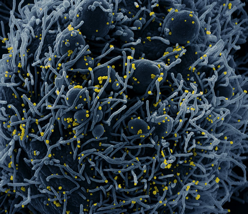

A new study has begun recruiting at the National Institutes of Health in Bethesda, Maryland, to determine how many adults in the United States without a confirmed history of infection with SARS-CoV-2, the virus that causes coronavirus disease 2019 (COVID-19), have antibodies to the virus. The presence of antibodies in the blood indicates a prior infection. In this “serosurvey,” researchers will collect and analyze blood samples from as many as 10,000 volunteers to provide critical data for epidemiological models. The results will help illuminate the extent to which the novel coronavirus has spread undetected in the United States and provide insights into which communities and populations are most affected.
Image: Colorized scanning electron micrograph of an apoptotic cell (blue) infected with SARS-COV-2 virus particles (yellow), isolated from a patient sample. Image captured at the NIAID Integrated Research Facility (IRF) in Fort Detrick, Maryland. NIAID
